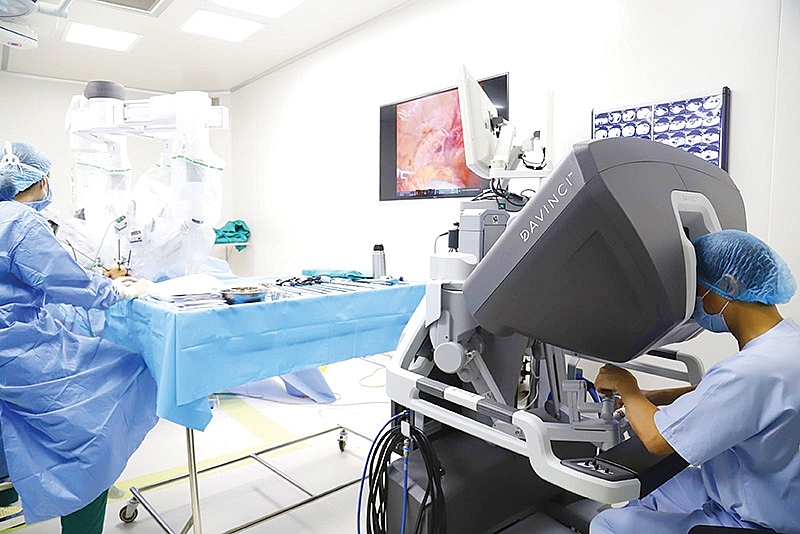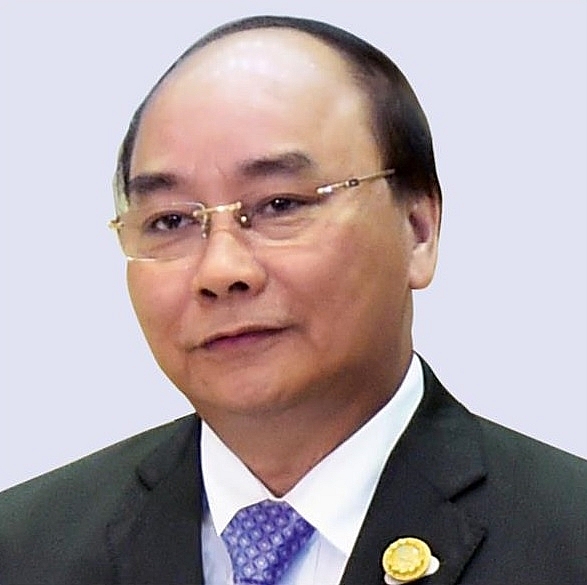New tech heading up healthcare industry
 |
| Health-tech multinationals are arriving in Vietnam or expanding further to help solve remaining challenges, Le Toan |
Just several days after launch this month, Bluezone, a tracing app developed by technology firm Bkav to help determine if a person has come into contact with a coronavirus patient, is receiving strong interest among locals.
Nguyen Phuong Nam, a 40-year-old white-collar worker said, “This app is meaningful as it comes at the right time when the healthcare sector is fighting against COVID-19. Myself, my friends, and my relatives are eager to learn about this technology to protect ourselves.”
Nam added that living in a digital age means healthcare should not be an exception. “The sector needs to develop more technology services and software to increase its quality and healthcare access for all,” he noted.
New starting milestone
Empty streets, no opened shops, and no gatherings – this has been the image of Hanoi during social distancing in the past few weeks. Instead, people increasingly were forced to use more online communication and information exchanges.
During the current pandemic, Vietnamese people are aware that there is not yet enough digitalised technologies, especially in terms of healthcare software for locals.
In the wake of this, tech giant Viettel this month has developed a remote medical examination and treatment platform which can provide services such as remote medical and surgery consultation, remote training, telemedicine consultation, and remote tech transfer among others.
The availability of Bluezone and the Viettel platform has marked a new milestone in digital transformation of the healthcare sector, with more mindsets being changed. Thousands of healthcare units and millions of locals will benefit from this evolution.
“Telemedicine consultation is accompanied by simple medical devices such as thermometers, blood pressure meters, heart rate meters, diabetes meters, and COVID-19 tests that will be strongly developed in the near future. With technology advancements, these medical devices will become cheaper and so will facilitate healthcare development at home,” said Minister of Information and Communications Nguyen Manh Hung.
“Vietnam has the advantages such as powerful telecoms and IT groups, nationwide infrastructure, and resources which can develop platform infrastructure to speed up digital transformation in important sectors like education and healthcare,” Hung elaborated. “The country needs more platforms, and so we call on the business community to join the development.”
Online hospitals and telemedicine, electronic medical records, and family healthcare have developed rapidly over the years. However, they are still in relatively early stages of development. The pandemic is accelerating this process.
Addressing the Bluezone app launch, the prime minister asked the Ministry of Information and Communications (MIC) and the Ministry of Health to develop technology platforms for healthcare such as those for telemedicine and smart health management, to build national databases for healthcare, and to complete a legal framework along with common and technical standards in order to encourage digital transformation in the sector.
More players in race
Vietnam’s current bed capacity is the second-best in Southeast Asia (22 beds per 10,000 people) and investment in healthcare is seeing double-digit growth on-year. However, there are still challenges that need to be overcome as the healthcare demand grows. With 4.5 doctors per 10,000 people and mainly located in the main cities of Ho Chi Minh City and Hanoi, technology is one way to bridge this gap.
Multinational health-tech giants and health-tech startups are aware of this, and are expanding in the country to tap into its rising smartphone penetration rate at 84 per cent (one of the highest amongst Southeast Asian countries), and a young population with heightened technology adoption.
Hanoi French Hospital, one of the most famous foreign-invested health facilities in northern Vietnam, has just expanded its tele-medicine capability to help patient follow-up on convalesce after a procedure, or on a chronic condition.
Meanwhile, Hanoi Medical University Hospital is a successful example of the transformation into digital operations which helps ease overloads and increases efficiency.
On the business front, GE Healthcare is set on empowering healthcare delivery in Vietnam through innovation-led solutions.
Seeing the potential, healthcare-tech startups are also increasingly joining the race. Singapore-headquartered Doctor Anywhere, a regional tech-led health and wellness company, made its official entrance in the Vietnamese market in mid-2019, and is already developing strongly in the country.
Meanwhile, eDoctor is expanding with its digital platform, seeing demand for its online consultancy increasing by at least 200 per cent in the past few weeks, with the trend to continue to grow further.
As expected, the MIC and the Government Office are promptly finalising and submitting to the government a national digital transformation programme for issuance within this month, thus giving a big push in digital transformation in healthcare and across sectors, and new chances to tech firms in the time to come.
| Nguyen Xuan Phuc - Vietnamese Prime Minister
The launch of a remote medical examination and treatment platform and Bluezone app is considered a starting milestone in digital transformation in the healthcare sector, and a step forward to realising the goal of turning the country into a digital nation. I expect this kind of platform will be developed successfully at 14,000 healthcare facilities nationwide. Never-before-seen digital applications are now booming in the healthcare sector. Telehealth remains a new service in Vietnam, but this will contribute to promoting digital transformation in the sector, thus helping increase the quality of healthcare services for people. Roeland Roelofs - Country president, Novartis Vietnam
Passionate startups are the vanguard of health tech. In Vietnam, we are working with Hello Bacsi, Docquity, Cisco, and others to translate innovation into real solutions for patients. The Biome is also about investing in building the ecosystem for better solutions tomorrow. Through the Biome, we plan to host events to bring the external and Novartis community together and facilitate networking opportunities. We will issue challenges to the ecosystem and recognise new ideas that solve real-world business challenges. Our company will provide various support services to companies that participate in the Biome programme to accelerate their development and demonstrate viability. Novartis’ first digital innovation hub in Asia, Novartis Biome India, is a digital innovation hub aimed at boosting the connection and interaction between Novartis and partners across the digital ecosystem. Apart from workspace, Biome will also provide state-of-the-art IT sandbox infrastructure that will host a series of emerging technologies to promote collaboration and innovation. Biome aims to scale up, complement, and enhance the progress made by startups and health innovators in India. Nguyen Thanh Phan - CEO, Doctor Anywhere Vietnam
Vietnam’s huge population and high number of smartphone users promise blooming growth for healthcare services. Besides that, the Vietnamese government is encouraging digitalisation through a circular outlining guidelines for telemedicine, which sets the foundation for health-tech services to take off. Doctor Anywhere aims at being a super-app and a one-stop place for all users’ healthcare needs. We connect all the healthcare networks, offering products at all stages thanks to Singaporean technology. Apart from our three traditional markets of Vietnam, Singapore, and Thailand, we are also planning to venture into Malaysia, Myanmar, and the Philippines. As we soon venture into these markets, we will continue to personalise and localise our healthcare services to bring optimal experience to each country’s users. |
What the stars mean:
★ Poor ★ ★ Promising ★★★ Good ★★★★ Very good ★★★★★ Exceptional
Themes: Digital Transformation
- PM sets five key tasks to accelerate sci-tech development
- Ho Chi Minh City launches plan for innovation and digital transformation
- Dassault Systèmes and Nvidia to build platform powering virtual twins
- Sci-tech sector sees January revenue growth of 23 per cent
- Advanced semiconductor testing and packaging plant to become operational in 2027
Related Contents
Latest News
More News
- SK Innovation-led consortium wins $2.3 billion LNG project in Nghe An (February 25, 2026 | 07:56)
- THACO opens $70 million manufacturing complex in Danang (February 25, 2026 | 07:54)
- Phu Quoc International Airport expansion approved to meet rising demand (February 24, 2026 | 10:00)
- Bac Giang International Logistics Centre faces land clearance barrier (February 24, 2026 | 08:00)
- Bright prospects abound in European investment (February 19, 2026 | 20:27)
- Internal strengths attest to commitment to progress (February 19, 2026 | 20:13)
- Vietnam, New Zealand seek level-up in ties (February 19, 2026 | 18:06)
- Untapped potential in relations with Indonesia (February 19, 2026 | 17:56)
- German strengths match Vietnamese aspirations (February 19, 2026 | 17:40)
- Kim Long Motor and AOJ Suzhou enter strategic partnership (February 16, 2026 | 13:27)




 Tag:
Tag:


















 Mobile Version
Mobile Version